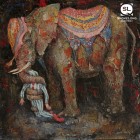What was the seed of this story? Did you set out to write something clever about Infinite Jest specifically, or did the story perhaps spark from a passing thought that the book itself could crack a floor or stand in for a rugby ball? (According to Google, it weighs approximately four times the weight of a regulation rugby ball—those poor players!)
The seed of this story was a conversation that I had with a friend about our experiences reading Infinite Jest. I think it was sparked by the movie The End of the Tour. I read a lot on the subway, so when I read IJ, I was carrying it around all the time, and it’s really heavy! IJ is a difficult book to get a handle both physically and intellectually, and when I was reading it, it absolutely consumed my life. I was reading it on my way to work, at lunch, on my way home, and before going to sleep. My friend had the same reaction, so the idea was a story about how this book kept popping up wherever the reader might be and physically and psychologically weighing him down.
To my reading, the piece carried a satirical tone throughout, and I wondered if you weren’t making a comment on the pedestal Infinite Jest has been placed on in all of its 1,079-page postmodern glory. At the end I was left with the question, “Does Jeff Bakkensen love, hate, or fear this book?” Would you care to elaborate?
I love and fear this book. I was at a discussion with Mary Karr where she said that he could have cut out a major subplot and made the book more accessible, and she was completely right, but to my mind the book stands better as it is, self-imposed warts, diversions and all. IJ was the first of Wallace’s fiction I ever read, and it changed my ideas about how complex themes could be tackled with everyday language and about the way a novel could be structured. Almost everyone I know who’s read Wallace’s fiction talks about how it feels like he was inside their head, accessing their thoughts and working them out on the page. I love IJ for its humor, its zaniness and its deep humanity; I would like to think of myself as the person who thinks what Wallace writes. I fear the book because anyone trying to write in maximalist style nowadays does so in IJ’s deep and long shadow.
There’s definitely something about having conquered IJ serving as a badge of membership for Wallace fans. I’ve seen interviews where Wallace talks about his fear of the hype about the book overwhelming the book itself, and for readers within this niche community of Wallace-worshipers, that’s exactly what’s happened. This short was essentially about how the difficulty of the read and joining that niche elite can overshadow the experience of reading. The main character doesn’t want to read IJ; he wants to have read it.
Something else that struck me about this piece is that you took an ending many creative writers consider to be cliché—”it was all a dream”—and reimagined it, giving it a fresh twist. Was that intentional?
I know, I know—dream sequences. I dream a lot, but I only ever remember the same three or four dreams. I played rugby for Georgetown, and one of these dreams is hitting a gap in the defense and realizing that I’m running in slow motion. It seemed only natural that someone reading IJ would find the book invading his dreams. Once I made that decision, I called up my recurring dreams, one of which happens to replicate a recurring dream of one of IJ’s main characters.
Unlike the protagonist of your story, have you ever successfully tackled the ambitious task of reading Infinite Jest cover-to-cover?
I have. I tried to read IJ once by myself and gave up after about two hundred pages. I succeeded when I read with a bunch of friends. We set a schedule and had discussions every week or so. It was a huge help, and of course now we’re very self-satisfied with our positions as members of the Wallace elite.
Who are some of your favorite authors, and what are you reading right now?
I have an embarrassingly limited fiction background, which essentially comprises twentieth-century white men. I’m always trying to branch out, but when I find an author I like, I tend to read everything, which limits my exposure. My favorite authors are Wallace, George Saunders, Saul Bellow, and Martin Amis. I try to alternate fiction and nonfiction, so right now I’m reading Moonwalking with Einstein by Joshua Foer. It’s a book about improving your memory. The last fiction I read was Gary Shteyngart’s Super Sad True Love Story. I think my next read will be The Beautiful Bureaucrat by Helen Philips. I also recently changed my commute to walking-heavy, subway-light route, so who knows if I’ll ever read again?



 The core workshop of SmokeLong Fitness is all in writing, so you can take part from anywhere at anytime. We are excited about creating a supportive, consistent and structured environment for flash writers to work on their craft in a community. We are thrilled and proud to say that our workshop participants have won, placed, or been listed in every major flash competition. Community works.
The core workshop of SmokeLong Fitness is all in writing, so you can take part from anywhere at anytime. We are excited about creating a supportive, consistent and structured environment for flash writers to work on their craft in a community. We are thrilled and proud to say that our workshop participants have won, placed, or been listed in every major flash competition. Community works.